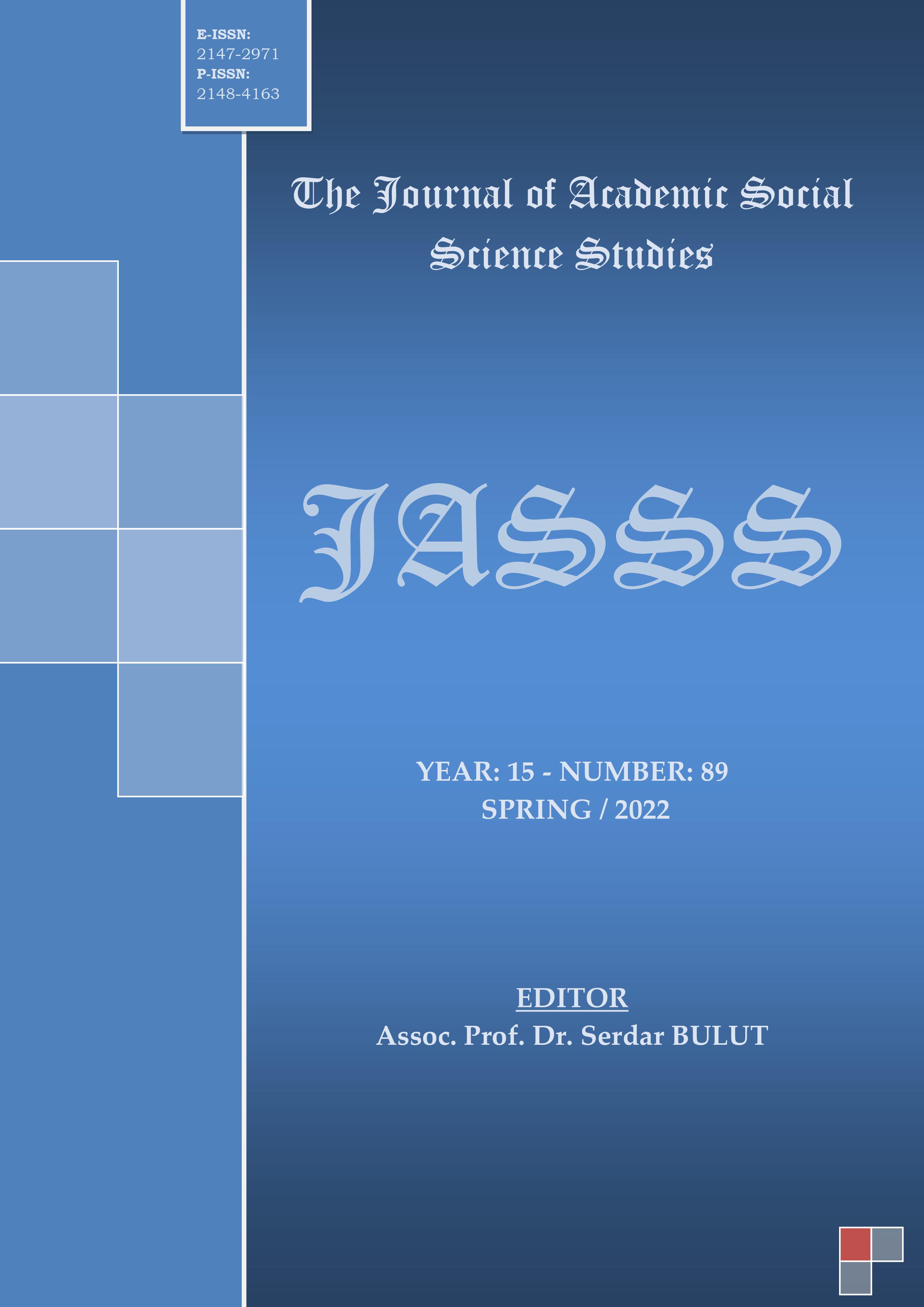Author :
Abstract
“Ruhun diyalektiği”, Rus edebiyat eleştirmeni, yazar, devrimci demokrat, teorisyen Nikolay G. Çernışevski’nin (1828-1889) Lev N. Tolstoy’un (1828-1910) edebî yaratıcılığına dair değerlendirmelerde bulunduğu makalesinde ortaya çıkarılan bir kavramdır. Çernışevski, kendi düşünce dünyasıyla ilişkili olan diyalektik kavramıyla Tolstoy’un yaratıcılığının ortak özelliğini bu şekilde nitelendirir. Kendisinin toplumdaki dinamiklerin meydana getirdiği sürece dikkat ettiği gibi Tolstoy’un da insanın ruhunda ortaya çıkan çelişkileri, çatışmaları, değişimi ve gelişimi gösteren psikolojik sürece odaklandığını görür. Birey olarak insanın psikolojisinin ve davranışlarının aynı zamanda parçası olduğu toplumu yansıttığı yaklaşımıyla, Tolstoy yaratıcılığında ortaya çıkardığı söz konusu kavramın incelenmesine önem verir. Bu kavramın ifade ettiği yenilik, psikolojik sürecin kendisinin anlatılması ve Rus edebiyatında öne çıkan Tolstoy’un psikolojik analizinin bir yöntemi olmasıdır. Tolstoy özellikle edebî yaratıcılığının ilk dönemindeki eserlerinde ve savaş hikâyelerinde insan psikolojisine yoğunlaşır. İnsan ruhunu ayrıntılı bir şekilde incelediğini gösterir. İnsan ruhunun birçok zıt ya da uyumlu özellikler gösteren, her şeyiyle bir bütün olduğunu yansıtır.
Tolstoy, Sivastopol Hikayeleri’nde kahramanlarının psikolojik sürecini ayrıntılı bir şekilde betimlerken bir bütünü her parçasıyla anlatma yöntemiyle hareket eder. Yazar, bir insanın hem iyi hem de kötü olabileceği düşüncesini ileri sürer. Çalışmamız kapsamında Çernışevski’nin kullandığı “ruhun diyalektiği” kavramının ortaya çıkışı açıklanacak, Tolstoy’un düşünce dünyasındaki söz konusu kavramla örtüşen benzer ifadeleri gösterilecek ve Sivastopol Hikâyeleri ekseninde bu kavrama ait psikolojik analiz özellikleri incelenecektir. Hikâyelerde Tolstoy’un anlattığı insan ruhunun süreç içerisindeki dönüşümü irdelenerek yaratıcılığının “ruhun diyalektiği” kavramını karşıladığına ulaşılacaktır.
Keywords
Abstract
“Dialectic of the soul” is a concept that emerged in the article of Russian literary reviewer, writer, revolutionary democrat, theorist Nikolay G. Chernyshevsky (1828-1889) in which he made his assessment about the literary creativity of Lev N. Tolstoy (1828-1910). This is the method of Chernyshevsky qualifies of the “dialectic” concept which is related to his own thought-world as a mutual feature of Tolstoy's creativity. As he was being interested in the process which emerged by the dynamics of the community he see that Tolstoy was focused on the psychological process which describes conflicts, contradictions, changes, and improvements that emerged on the human soul. He gave priority to studying the mentioned concept which was existed in Tolstoy's creativity with the theoretical approach of as a human the individual represents the community to which he belongs with behavior and psychology. The innovation which this concept states, to be explained of the psychological process itself and it is one of Tolstoy’s psychological analysis methods who is a pioneer of Russian literature. Tolstoy, especially in the early periods of his literary creativity, concentrated on human psychology and war stories in his works. This is proof of his detailed investigation of the human soul. He describes the human soul as a whole that contains a lot of contradictions and harmonious features and is comprehensive with all dimensions.
While Tolstoy describes the psychological process of his heroes in detail in his Sevastopol Stories, he prefer to act with the method of telling the whole with every parts of it. The author puts forward the idea that a human can be both good and bad. Within the scope of our study, the emergence of the concept of "dialectic of the soul" used by Chernyshevsky will be explained, similar expressions of Tolstoy’s world of thought that match with the concept will be shown, and the features of psychological analysis around this concept will be examined based of the Sevastopol Stories of the author. By scrutinizing the transformation of the human soul during the process, which Tolstoy tells in the stories, it will be reached that the creativity matches the concept of "dialectic of the soul".
Keywords
- Behramoğlu, A. (2012). Rus Edebiyatı Yazıları (XIX. ve XX. Yüzyıllar). İstanbul: Tekin Yayınevi.
- Can, B. (2013). L. Tolstoy’un Sivastopol Öyküleri Örneğinde Rus Edebiyatı Penceresinden Kırım Savaşına Yaklaşım, 13. Uluslararası Dil, Yazın ve Deyişbilim Sempozyumu: Basit Üslup, 26-28 Eylül, Kars.
- Çausova, İ. A. (2017). Analiz Proizvedeniy Russkoy Klassiçeskoy Literaturı XIX Veka: Uçebnoye Posobiye. Moskva: “KDU”, “Universitetskaya Kniga”.
- Çernışevski, N.G. (1978). “Detstvo i Otroçestvo”, “Voyenniye Rasskazi” L. N. Tolstogo. Izbranniye Estetiçeskiye Proizvedeniya, (2. Baskı) İçinde (s. 515-525). Moskva: İskusstvo.
- Galagan, G. Ya. (1982). L. N. Tolstoy. İstoriya Russkoy Literaturi v Çetiryoh Tomah: Tom Tretiy Rastsvet Realizma İçinde (s. 797-851). Leningrad: Nauka.
- Gürsoy, Y. (2014). Nikolay Çernişevski ve Devrimcinin El Kitabı “Nasıl Yapmalı?”. (Ed. G. Öksüz). Rusya'da Eylemin Sanatla Buluşması Edebiyatta ve Sinemada Devrim İçinde (44-54). İstanbul: Çeviribilim.
- Harmat, M. (1972). “Dialektika Duşi” i Literaturniye Motivi (Po Romanu L. N. Tolstogo “Anna Karenina”). Dissertationes Slavicae. Materialı i Soobşçeniya po Slavyanovedeniyu VIII İçinde (s. 2734). Szeged: Instituti Philologiae Russicae in Universitate de Attila József Nominata.
- Hilâv, S. (1997). Diyalektik Düşüncenin Tarihi, (3. Baskı). İstanbul: Sosyal Yayınlar.
- Karataş, N.C. (2018). F. M. Dostoyevski’nin Yeraltı Dünyasına N. G. Çernişevski’nin Rasyonel Egoizm Teorisinden Bakış. (Ed. B. C. Tanrıtanır). Filolojide Güncel Akademik Çalışmalar-2018 İçinde (98116). Ankara: Gece Kitaplığı.
- Lebedev, Yu.V. (2016). Russkiy Yazık i Literatura. Literatura, (Bölüm: 2, 3. Baskı). Moskva: Prosveşçeniye.
- Matyuşenko, L.İ. ve Matyuşenko, A.G. (2019). Russkaya Literatura XIX Veka. Analiz Klassiçeskih Tekstov: Posobiye Dlya Inostrannıh Uçaşihsya-Filologov. Moskva: MAKS Press.
- Merejkovskiy, D.S. (2000). L. Tolstoy i Dostoyevski. İzd. pod. Ye.A. Andruşçenko, Moskva: Nauka.
- Motilyeva, T.L. (1957). O Mirovom Znaçenii L.N. Tolstogo. Moskva: Sovetskiy Pisatel’.
- Ryabinina, N.V. (2009). Osnovi Analiza Hudojestvennogo Teksta. Uçebnoye Posobiye. Moskva: Flinta.
- Şilin, V.V. (2019). Slovar’ Literaturovedçeskih Terminov. Moskva: “Kanon-Plyus” ROOI “Reabilitatsiya”.
- Tolstoy, L.N. (1953). Polnoye Sobraniye Soçineniy: Tom 65. Pis’ma 1890-1891 (Yanvar’-iyun’). Moskva: Gosudarstvennoye Izdatel’stvo Hudojestvennoy Literaturi.
- Tolstoy, L.N. (1983). O Şekspire i o Drame (Kritiçeskiy Oçerk). In Sobraniye Soçineniy v 22 Tomah: Tom Pyatnadtsatıy (p. 258-314). Moskva: Hudojestvennaya Literatura.
- Tolstoy, L.N. (1984). Sobraniye Soçineniy v 22 Tomah: Tom Dvadtsat’ Pervıy Izbrannıye Dnevniki 1847-1894. Moskva: Hudojestvennaya Literatura.
- Tolstoy, L.N. (2012). Sivastopol, (2. Baskı), (Çev. M. Beyhan). İstanbul: Türkiye İş Bankası Kültür Yayınları.
- Tolstoy, L.N. (2019). Diriliş, (11. Baskı), (Çev. A. Hacıhasanoğlu). İstanbul: Türkiye İş Bankası Kültür
- Turgenyev, İ.S. (1987). Polnoye Sobraniye Soçineniy i Pisem v Tridtsati Tomah: Pis’ma Tom Çetvortıy 1859- 1861. Moskva: Nauka.





